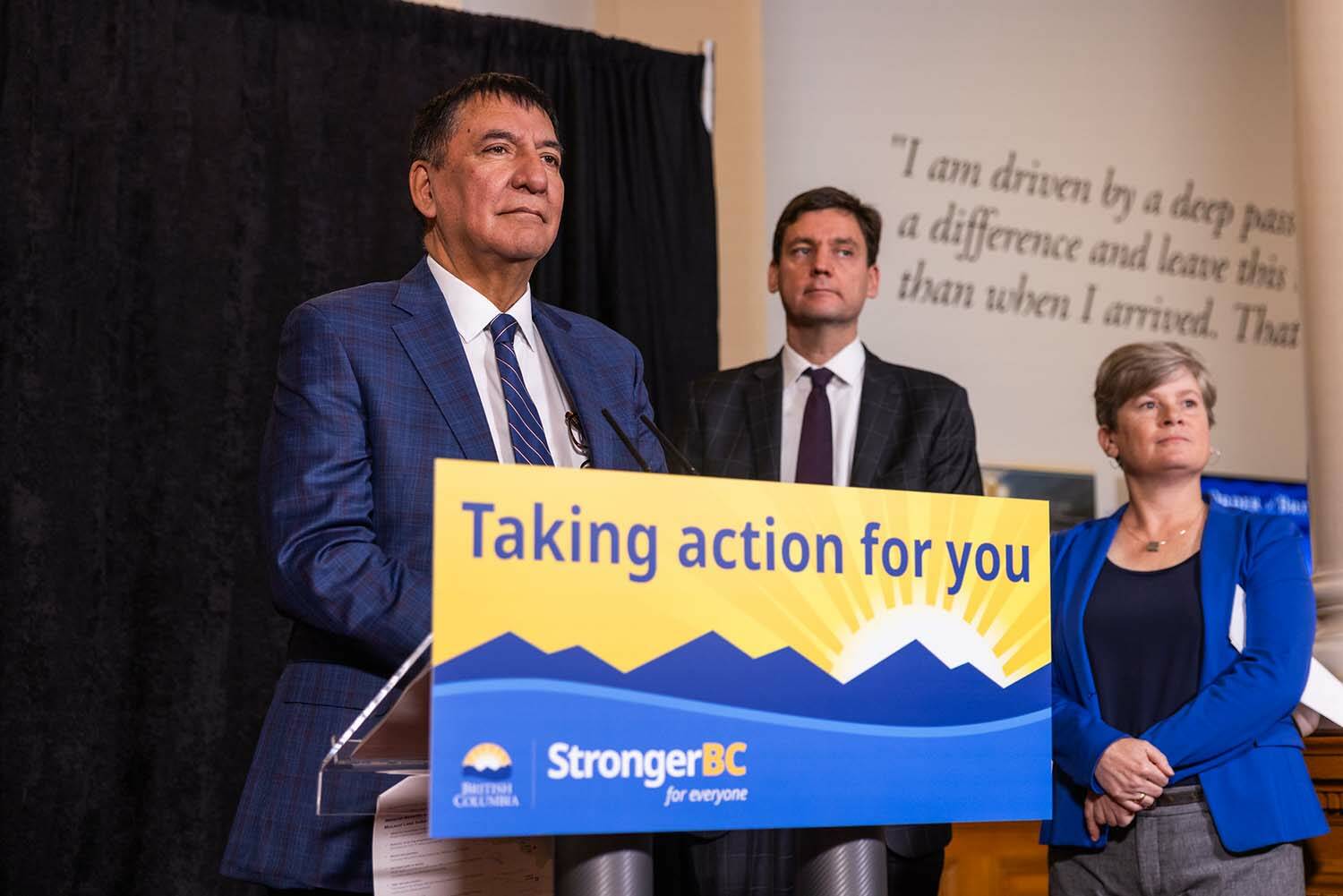Plans for an energy hub that would produce various forms of hydrogen but also connect to a controversial pipeline took another step Wednesday (Oct. 25) as the province signed a memorandum of understanding with McLeod Lake Indian Band.
Premier David Eby, McLeod Lake Indian Band Chief Harley Chingee and Michelle Carr, commissioner and chief executive, BC Energy Regulator, participated in a signing ceremony at the legislature for the project. Energy Minister Josie Osborne and Environment Minister George Heyman joined the trio.
One part of the proposed Tse’khene energy transition hub in northestern B.C. calls for a hydrogen-producing facility, reportedly worth $5 billion. It would create ‘green’ hydrogen through electrolysis using renewable electricity, as well as ‘blue’ hydrogen created through natural gas.
Plans also call for a straddle plant reportedly worth $2 billion that would recover and refine natural gas products from liquid waste that would have otherwise be burned off. The plant would be connected through existing pipelines to the Trans-Canada Energy’s Coastal GasLink, which has drawn opposition from various groups, including members of the Wetʼsuwetʼen First Nation in the Burns Lake area.
Chingee said the hub has four pipelines on its right-of-way.
“Three kilometres away, is (TC’s Coastal GasLink) that is also going to be connected to the system,” he said. “That is where we are going to be extracting the products for the straddle plant — methane, propane, what have you.”
Eby also acknowledged that “there is a possibility of a need for some pipeline infrastructure related to hydrogen generation on the site” and “what that looks like is very dependent on what MLIB brings forward with their partners,” pointing to language in the MOU.
RELATED: 4 B.C. First Nations, forest company strike ‘landmark’ $36M deal
RELATED: Chief Harley Chingee says forestry remains the ‘bread and butter’ of McLeod Lake Indian Band
RELATED: ‘A bill that’s gone unpaid’: 5 B.C. First Nations receive cash, land settlements from province, feds
RELATED: 4 B.C. First Nations reach land-management consensus with province
RELATED: B.C. government, Blueberry River First Nations reach land management agreement
When media asked Eby about the use of Coastal GasLink, he framed his position as the middle between those who oppose all fossil fuel developments and those who want to approve everything.
“We have to recognize that fossil fuel infrastructure’s future is limited, because we are moving toward a fossil-fuel free future,” he said. “At the same time, there will be a transition. People are still using fossil fuels around the world right now. If we are going to be involved in the export of natural gas, which we are through the LNG Canada pipeline, that we get every single bit of value from that resource that we can for British Columbians, especially for our Indigenous partners.”
He also noted that the straddle plant could have “a net zero and potentially, slight negative impact on carbon emissions,” adding that “it gets more value out of the resources we already have.”
Eby, who rarely misses an opportunity to promote hydrogen, said the hub, if fully developed, would be one of the largest Indigenous-owned energy projects in Canada at $7 billion with the potential to create “significant” (but unspecified) amounts of green hydrogen.
He added that the hub would help B.C. de-carbonize its provincial economy, especially in areas that are difficult to de-carbonize like heavy duty trucking.
B.C. has set itself the goal of reducing greenhouse gas emissions by 40 per cent (based on 2007 emissions) by 2030. He added that it would also generate future jobs for the benefit of local First Nations as well as British Columbians at large, combining economic development with Reconciliation.
“It’s quite an elegant proposal,” Eby said. “I am very honoured to be standing here with the Chief, who has put this proposal together.”
Chingee said MLIB hopes to break ground on the project with its 2,000 expected construction jobs and 500 expected permanent full-time jobs within 16 to 24 months.
“My message to our band members is that we have been working hard to develop an environmentally and culturally responsible opportunity that, if successful, will make us a key contributor to a clean-energy future while also delivering much-deserved prosperity to our band and its members,” Chingee said. “My message to industry is that the MLIB is a commercially sophisticated and enthusiastic potential partner.”
@wolfgangdepner
wolfgang.depner@blackpress.ca
Like us on Facebook and follow us on Twitter.

